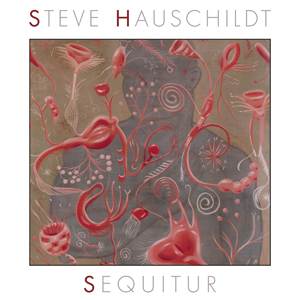Steve Hauschildt Sequitur
By no stretch would it be accurate to call Ohio-born musician Steve Hauschildt an innovator. […]

By no stretch would it be accurate to call Ohio-born musician Steve Hauschildt an innovator. Both as one third of Emeralds and as a solo artist, the Midwestern synth guru predominantly relies on vintage analog hardware and uses the sounds those machines create to harken back to the warm and relatively simplistic arrangements explored by iconic artists like Giorgio Moroder, Harald Grosskopf, and Tangerine Dream. However, listening to the cosmic synth tapestries on last year’s excellent Tragedy & Geometry album never inspired any obvious comparisons or kitsch-induced grimaces; even though Hauschildt was never changing the musical landscape with his twinkling kosmiche compositions, his music bursted with austere beauty and unique character. Those qualities pervade much of Hauschildt’s latest LP, Sequitur, though they’re juxtaposed with a handful of forays into the realm of synth-pop, which are seldom as beautiful or unique.
It’s entirely understandable why Hauschildt was curious to apply his skills on the keyboard to a pop-leaning format. Not only is he deft with composition and tone, the man is an outright genius when it comes to writing memorably touching melodies, and practically all of his work bears testament to the fact. But why tracks like “Constant Reminders” and “Accelerated Yearning” fall flat is less related to the songwriting and more about the sound selection. Hauschildt leans toward an almost dopey kind of playfulness during these moments, often times sounding something like a Muzak version of Daft Punk or Orchestral Manoeuvers in the Dark making lounge music. The vocoded lyrics on “Constant Reminders” (“We’re all connected, can’t you see that it’s true?”) come off a bit chincy and cliché. “Mixed Messages”—despite easily being the best of this ilk—uses what could very well be a preset demo from a Casio SK-1 as its central melody. None of which is the least bit terrible in and of itself, but when set alongside Sequitur‘s more immersive and transcendent tunes, the contrast in character and style is too stark to ignore.
Thankfully, most of Hauschildt’s eight-track LP further explores the sounds and themes that made Tragedy & Geometry the brilliant record it is. “Interconnected” opens the proceedings in a particularly lush fashion, boasting a synthetic choir pad, plinking arpeggiations, a warming bassline, and one hell of a poignant lead melody at its core. Frankly, the music is as comforting as it is downright beautiful. Things get a bit more mysterious and hypnotic down the tracklist, as “Sequitur,” “Vegas Mode,” and “Kept” put the listener into a kind of lucid suspended animation with their twinkling atmospheres and interwoven sequences. Sequitur ends with “Steep Decline,” the album’s longest song at five and a half minutes. (By comparison, the lengthiest tune on Tragedy was 11 minutes.) Hauschildt is unusually understated in his closing piece, maintaining a quiet hum of lulling tones and synths that never quite manage to swell to capacity. As the arrangement—carried by a softly thumping drum machine—continues growing in size and intensity, the moment of cathartic release seems just beyond the horizon, but is never reached. The restraint exhibited in “Steep Decline” can be refreshing, not to mention the difference between a gaudy or indulgent song and something more palatable and refined. Maybe it’s something that Sequitur could’ve used a little more of.

